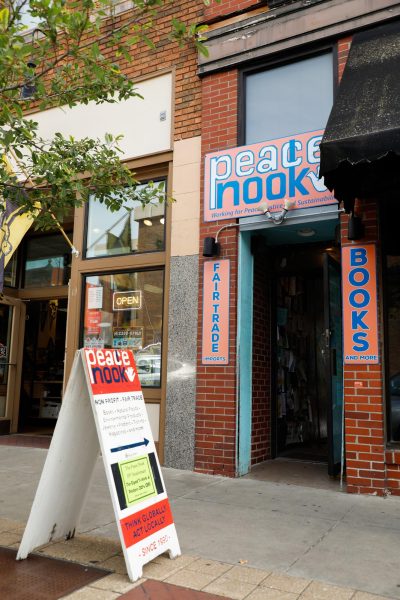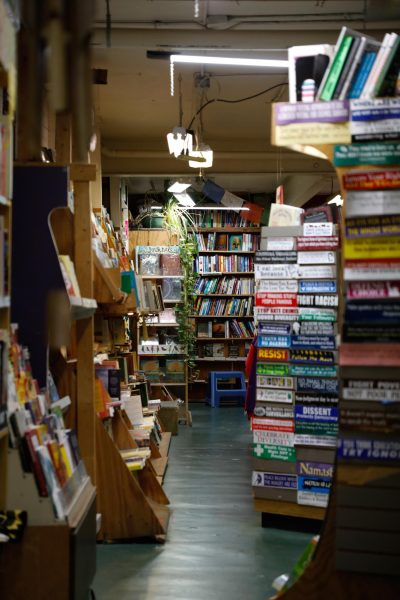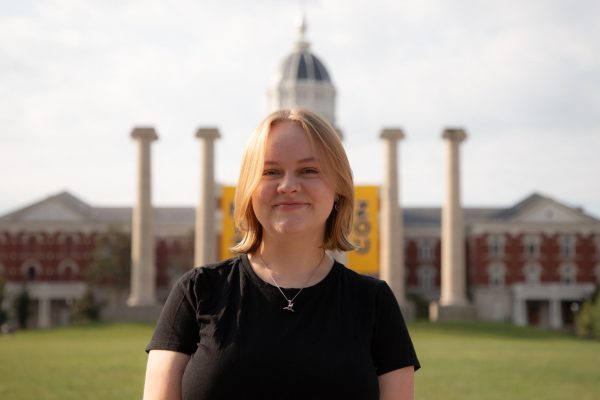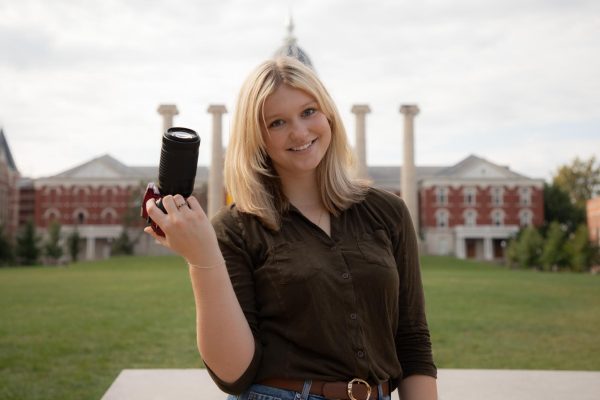Beyond the fair trade products, progressive literature, social justice bumper stickers and buttons, is a grassroots organization working within Peace Nook’s walls. The downtown Columbia store opened its doors on Aug. 24, 1990 and for 35 years it has served as a community resource center for Mid-Missouri Peaceworks and its mission.
The Peaceworks organization started in Columbia and “holds a vision of an ecologically sound, sustainable world and a violence-free community in which human equality and justice flourish,” according to their mission statement.

The store is mostly operated by volunteers, with only a handful of paid staff members. Peace Nook operates with a people over profits mindset, according to director of Mid-Missouri Peaceworks Mark Haim.
With the exception of operation costs, all sale proceeds help support Peaceworks educational and advocacy efforts.
Haim describes Peace Nook as more than a store. He calls it “a home to people of the community,” whether that be a university student in Columbia, an immigrant or a longtime resident.
Haim said that Peaceworks and Peace Nook appeal to a wide range of community members who are inspired by one of the many issues the organization deals with including peace, climate change, LGBTQ+ rights, fair trade or economic justice.
Peaceworks has been around since 1982, eight years before the Peace Nook store opened in Columbia. The organization began operations out of a small rented office.
When the organization decided to open a store in 1990, it primarily served as a new space for Peaceworks to interact with more of the Columbia community.
In addition to incorporating Peaceworks into the public eye, Haim said the storefront provided more opportunities for sharing their advocacy work through newsletters and petitions. Still, 35 years later, petitions and newsletters can be seen by shoppers who visit Peace Nook.
Opening a storefront also allowed Peaceworks to support fair trade.
“I had no idea that we were creating something that would be as enduring,” Haim said. “I feel it’s an accomplishment in this economy and this political time, to have [the] support of the community.”

When Peace Nook first opened its doors, most of the store was similar to today’s layout, except for one big change – second-hand clothes. In 1990, a significant portion was taken up by the organization’s thrift store. Later on, as Peace Nook’s selection of books and fair trade items grew, the store replaced the thrift store to make room for other products.
While Peaceworks has no formal affiliation with the University of Missouri, students, faculty and staff have helped promote the work of Peaceworks from the very beginning. In addition to volunteers, they often have students from MU service-learning courses work with the organization.
Peaceworks also participates in the Palestine Solidarity March with Mizzou Students for Justice in Palestine. After MSJP stepped back from leading those marches, Mid-Missouri Peaceworks and other local community members have helped continue them.
The very fact that Peace Nook is located in a university town helps curate the unique environment that has been a part of downtown for 35 years, according to Haim.
“There’s more diversity that’s included in our community, and Peace Nook thrives in that environment because we appeal to and have products that interest, and opportunities to volunteer that interest, people from around the country and around the world,” Haim said.
When Peaceworks first started, it was a nuclear weapons freeze group under a different name. The group advocated against the nuclear arms race between the U.S. and Soviet Union.
Various wars and peace issues in Central America were on the forefront in the later 1980s. In the late ‘90s, Peaceworks focused on climate change advocacy work.
More recently, Peaceworks says it is focusing on the Palestine-Israel conflict, what they call the rise of fascism and climate change.
In what Haim describes as a critical time for engagement, Peaceworks plans to continue serving as a space for people to get involved in social justice and advocacy.
Edited by Maggie LeBeau | [email protected]
Copy edited by Emma Harper | [email protected]
Edited by Alex Gribb | [email protected]
















